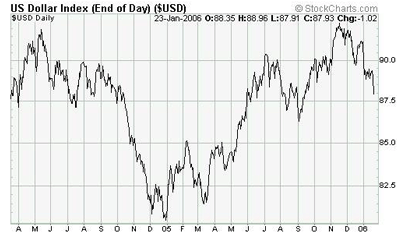| Home | About Us | Resources | Archive | Free Reports | Market Window |
Fred and Henry... Unlikely BedfellowsBy
Wednesday, January 25, 2006
Henry Blodget is one of the most influential stock pumpers of all time. He’ll go down in history as the “poster boy of Internet hype.” He worked for Merrill Lynch during the dotcom bubble, insisting the public buy overpriced Internet stocks... while telling his colleagues the same stocks were crap. Fred Hickey is an independent analyst and personal investor whose research has focused on computer and tech-media companies for over 26 years. Blodget is an exposed liar trying to build a new career as a financial columnist. Hickey is an experienced tech stock analyst with his own money on the line. Both men are experts in over-hyped tech stocks. Both men have a large personal stake in the predictions they make... and they’re both making the same prediction right now. This month, Blodget and Hickey have both commented on the same stock. The stock is Google (GOOG). Both men think Google’s stock price is trading hundreds of dollars above its fair market value. Costs are out of control, they both say, and there are major threats to Google’s revenue stream... threats that are not reflected in the stock price. These opinions are a far cry from the sentiment on Wall Street right now... Investors don’t just love Google, they think it’s going to change the world. There’s so much optimism, one Wall Street firm just issued a long-term price target of $2,000. It’s the same on Main Street. I entered an online stock picking competition a few weeks ago. Entrants had to pick three stocks and hold them for a year. Ten of the 17 players picked GOOG. Google is the most overvalued large-cap stock in the US. Two weeks ago, Google’s p/e ratio reached 103. That’s an astonishing value for a company with a market valuation comparable to that of JPMorgan Chase (NYSE:JPM), Berkshire Hathaway (NYSE:BRK.A) or Chevron (NYSE:CVX). But what’s this? Last week, Google fell nearly 15%. Friday’s 8.5% drubbing was the largest one-day drop in the stock’s history. The stock closed below $400. It had been over $475 just a few days earlier. Blodget says Google could go below $100 per share. He sees a scenario where “revenue and profits are plummeting... global advertisers are running away from the distaste, expense and frustration associated with search marketing as fast as they are currently running towards it and... Google has transformed from a symbol of the American dream to yet another get-rich-quick hallucination.” Fred Hickey compares Google in 2006 to Yahoo in 2001. “In 2000, Yahoo was just as invincible a stock as Google appears to be today,” Hickey writes. “In just five months, Yahoo’s stock rocketed from $110 to over $500. Analysts at the time were playing the ‘I can one-up your target price’ game with Yahoo’s stock [and] Yahoo consistently ‘blew away’ quarterly earnings estimates.” “In 2000-2001, Yahoo’s spending was skyrocketing, as they didn’t see the slowdown coming. When revenues slowed, the bottom line imploded. At the peak, Yahoo’s stock was ‘worth’ $119 billion, a little less than Google’s valuation today. By October 2002, Yahoo was worth $5.6 billion, a decline of 95%.” When both Blodget and Hickey tell me Google is overvalued and its stock price is set to fall by hundreds of dollars, I listen. When this week’s rebound fizzles out... when Google drops below $400 again... I’ll be reminded of Yahoo!’s massive fall in 2000. And I’ll be placing a bet that Google could do the same. Good Investing, Tom Dyson Market NotesA BIG, BIG DROP IN THE DOLLAR
|
The last two months have brought bad times to the U.S. Dollar. Monday’s trading took the dollar to a four-month low versus the euro… and the dollar has broken down from the uptrend it started in 2005. Blame it on oil… blame it on Iran… blame it on interest rates, but it's times like these that makes owning a large chunk of gold more and more attractive. A look at the past two years of the U.S. Dollar:
|
Recent Articles
|


